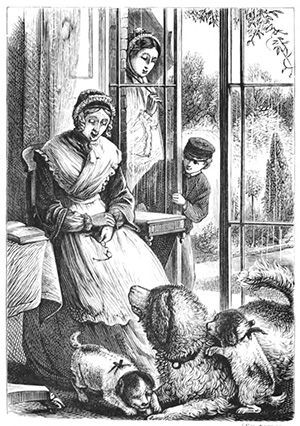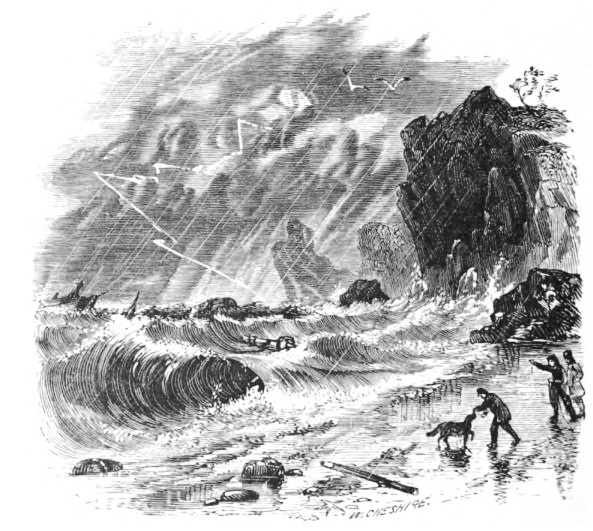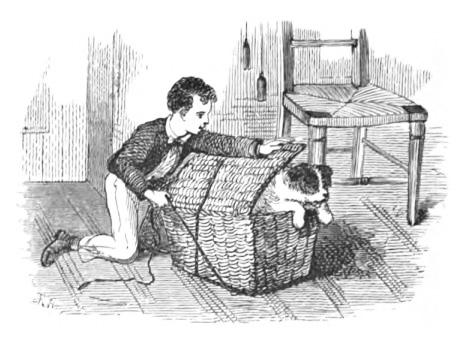[ Brightwell / Georgie's Present, or Tales of Newfoundland ]
Cecilia Lucy Brightwell (1811 - 1875) was an English author and illustrator, primarily of works for young readers.
Here is the Project Gutenberg blurb: "The book revolves around the adventures and experiences of a young boy named George Green as he celebrates his tenth birthday, exploring themes of family, companionship, and the wonders of Newfoundland. The narrative combines imaginative elements with depictions of life in Newfoundland, making it an engaging read for children. The story begins with George eagerly anticipating his birthday, where his grandmother shares tales of her past, particularly focusing on her husband’s missionary journeys in Newfoundland. Throughout these stories, George learns about the challenges faced by settlers and the natural beauty of Newfoundland. The central character, Boxa, a noble Newfoundland dog, plays a significant role, showcasing loyalty and bravery. Ultimately, George receives a Newfoundland pup named Newfy, symbolizing love, adventure, and the strong bond between humans and animals, leaving young readers with a sense of joy and wonder at the relationships depicted in the tale." For the full etext of this book (in multiple formats) at Project Gutenberg, click here.
This book was first published in 1871. The images — possibly by Brightwell herself — are here placed at their approximate location in the text.
The book opens with Georgie visiting his grandmother at her house.
Close by her side, upon the hearth, lay a splendid Newfoundland dog, which every now and then looked up at her with affectionate eyes that seemed to say, “How
much I love you.”
That moment Master George popped his merry face in at the open window, and greeted Mrs. Ward with a shout of joyous laughter. “Dear Granny, you didn’t know you were talking aloud; and how indeed were you
to guess that I was so close at hand to overhear you? Ah! how glad I am that you mean really to let me have the beautiful pup. I have chosen a name for it already: it shall be called Newfy, because its mother came from Newfoundland.”
“Its grandmother you should say, my dear,” replied Mrs. Ward; “Boxa’s mother came over with me from Newfoundland, and a wonderful animal she was for cleverness and beauty; but after all, she could not compare with dear old Box, her sire. He was a marvel of sagacity, and did feats which I really believe have never been surpassed.”
Georgie's grandmother relates various tales of her time, and that of her husband, in Newfoundland. Near the story's conclusion comes an account of her husband's involvement in shore rescue, aided by a Newfoundland:
It was a fearful sight. The sea was in a white foam, the whole air
filled with spray, and the wind blowing heavily. Not far from shore was
a boat with a part of the exhausted crew from a vessel wrecked in the
offing. The breakers made it impossible that the poor fellows should
effect a landing. A terrible death seemed their inevitable fate. Just at
the moment your grandfather reached the point, he saw his host leap into
the sea, his object being to give the men a rope. It was at the peril of
his life he took that desperate leap. His favourite dog, Boxa, saw and
instantly followed his master. The two rose in a moment, and were borne
by the swell toward the boat. They had nearly reached it when it
capsized. Moir--that was the name of the gallant man--seized one of the
seamen, and, wonderful to tell, succeeded in bringing him safe to shore.
In the meantime, Boxa, following his master’s example, caught hold of
another of the poor drowning creatures, and began to drag him along. It
proved, however, that the dog’s hold had fastened upon the seaman’s
south-wester cap, which came off in the water. The animal evidently was
not aware of what had happened, and, not perceiving the diminution in
the weight of his burden, was proceeding to make his way to land with
the cap only.
‘The poor fellow is lost!’ cried the bystanders on the
point.
But no! they presently saw the sailor clutch hold of the dog’s
tail,---it was a fine, handsome, large tail, George;--and in this manner
he was towed to land in safety. Imagine how glad he must have been when
he found himself on terra firma! His first act was to give thanks to
God, and then he threw his arms around Boxa, caressing him again and
again, and loading him with fond epithets, part in English, part in
Swedish. He was a young Swede, a fine, handsome youth, about twenty
years of age. Without loss of time he was conducted to the house, where
he shared the kind attentions of the mistress; but she had soon another
and a more difficult case in hand.
The story concludes with an account of how the family came to own Newfoundlands. Some short time after the above incident the grandfather, spending a night at a friend's house, saw his friend's "faithful dog crouched close beside him, dozing and evidently dreaming at intervals; for he made strange noises, and paddled with his fore-feet, as though he were still struggling with the waves.
His master looked fondly on the animal, and said,--"
‘You’d hardly credit, sir, the surprising sagacity of these dogs. Some
of them are perfect wonders. They have more sense, really, it seems,
than many so-called Christians, and I have sometimes thought they must
reason.
‘Boxa is a fair specimen of the race, and I could tell you some of his
doings which would make you ask--Is it possible? I have known him help
to carry to shore some light spars which the captain of a vessel in the
harbour desired him to convey to the land-wash, in order that a boat’s
crew might be saved the trouble of taking them. Another dog belonging
to the same wharf, whether of his own accord, or being pressed into the
service, took to helping him at this work for a time; he soon tired,
however, and, in the middle of his second turn, thought proper to swim
to shore without his spar.
‘When Boxa saw what he was up to, he quietly made his way to land with
his own turn, and then went in search of the runaway, and gave him
a sound thrashing; in short, his arguments were so unanswerable and
convincing that the culprit returned to his work, and without more
ado, set to and persevered at it, till every spar that had been thrown
overboard was rafted to shore by the combined labour of the two dogs.’
‘That was certainly a very sagacious and knowing proceeding,’ said your
grandfather, ‘and I do not wonder you are so much attached to your dog.’
‘O sir, that’s only a sample I give you of his sense and clever
ways. What I value him so much for it his fidelity to myself, and his
attachment to the whole family. As to the children, be they never so
small, we can always leave them without fear in his charge for hours;
and to crown his good deeds, I must tell you he saved the life of the
youngest of the fry. The child was playing close to the water-side, and
fell in. There was nobody near, and how the dog found it out we never
could tell; he was some distance off, and a few minutes before, when my
wife passed that way, she saw him lying asleep, to all appearance as
sound as a church door. But he must have heard the little one cry; for,
certain it is, he had dragged her out, and was licking her little face
and hands when the mother came back from her errand. You’ll not wonder
after that to hear that we would one and all of us share our last crust
with Boxa.’
‘I do not, indeed, my good friend,’ said your grandfather; ‘and I must
say I should be heartily glad to possess a dog of the breed having the
same admirable qualities; for I have just lost my good old terrier, a
tried and faithful animal, which I brought with me from England. He died
of old age, about a month ago, and sadly shall I miss him.’
Moir made no answer at the time, but the next day, shortly before his
guest departed, the worthy man made his appearance alongside the boat as
it was pushing off, and handed in a hamper which, he said, contained a
pup of the right sort, if his reverence would please to accept of it.
This pup was no other than the mother of Boxa, and an excellent animal
she proved to be--faithful, sagacious, and patient; in short, a worthy
scion of such a stock.
“I need not, I am sure, by way of conclusion, sing the praises of Boxa
herself, for you know as well as I can tell you her many good qualities;
and therefore I have only further to say that I hope Newfy--as you have
named him--will turn out all that could be wished.”
“Thank you, thank you, dear grandmamma,” said George, who had listened
with such fixed attention to the last part of Mrs. Ward’s narrative,
that he had not once moved upon his stool; “I am so pleased with my pet,
I shall not know how I can thank you enough. I think, if you please, I
will run and fetch him out of the kennel, and put him into the basket I
brought, hoping you would let me carry him home with me to-night.”
“Do so, George,” said his mother, folding up the handkerchief she had
been embroidering, “and in the meantime I will put on my bonnet, for it
is time we were on our way home.”
No sooner said than done. In five minutes George and Mrs. Green had said
good-bye and were crossing the common in the direction of their own
home.
“What a happy day it has been, mamma,” said our little friend, “and how
glad I am I have such a nice birthday present;” and he bent down to take
a peep through the wicker-work of the basket.
“And I am so glad, dear boy, that you have enjoyed your treat,” replied
his mother. “May you see many happy, returns of this day; and may each
succeeding year find you wiser and happier.”
Here ends the story of Georgie’s Present; but, as I think my young
readers may like to know how the Newfoundland pup turned out, I will
just tell them that he is now a full-grown, handsome young dog,--the
great favourite and inseparable companion of my friend George, who
assured me, not long ago, that of all his possessions there is none he
prizes more highly than Newfy.



